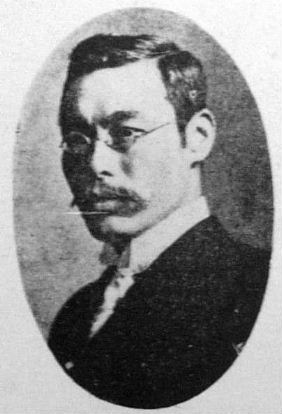Background
Futabatei Shimei was born Hasegawa Tatsunosuke in Edo (now Tokyo), Japan, on April 4, 1864. He was the son of a retainer of the Owari Clan Futabatei Shimei. Shimei belonged to the aristocratic samurai class.



(First edition hardcover. DJ has small tears, and spine is...)
First edition hardcover. DJ has small tears, and spine is slightly faded. Some tear away from DJ on inside front and back covers. Publisher name scallop clipped from title page. Back endpaper clipped. Pages are bright, binding is solid. No marks on pages.
http://www.amazon.com/gp/product/0231086660/?tag=2022091-20

(Trieste Publishing has a massive catalogue of classic boo...)
Trieste Publishing has a massive catalogue of classic book titles. Our aim is to provide readers with the highest quality reproductions of fiction and non-fiction literature that has stood the test of time. The many thousands of books in our collection have been sourced from libraries and private collections around the world.The titles that Trieste Publishing has chosen to be part of the collection have been scanned to simulate the original. Our readers see the books the same way that their first readers did decades or a hundred or more years ago. Books from that period are often spoiled by imperfections that did not exist in the original. Imperfections could be in the form of blurred text, photographs, or missing pages. It is highly unlikely that this would occur with one of our books. Our extensive quality control ensures that the readers of Trieste Publishing's books will be delighted with their purchase. Our staff has thoroughly reviewed every page of all the books in the collection, repairing, or if necessary, rejecting titles that are not of the highest quality. This process ensures that the reader of one of Trieste Publishing's titles receives a volume that faithfully reproduces the original, and to the maximum degree possible, gives them the experience of owning the original work.We pride ourselves on not only creating a pathway to an extensive reservoir of books of the finest quality, but also providing value to every one of our readers. Generally, Trieste books are purchased singly - on demand, however they may also be purchased in bulk. Readers interested in bulk purchases are invited to contact us directly to enquire about our tailored bulk rates.
http://www.amazon.com/gp/product/0649051920/?tag=2022091-20
correspondent educator literary critic novelist translator
Futabatei Shimei was born Hasegawa Tatsunosuke in Edo (now Tokyo), Japan, on April 4, 1864. He was the son of a retainer of the Owari Clan Futabatei Shimei. Shimei belonged to the aristocratic samurai class.
Shimei received his primary education at prestigious schools, such as the Sochosha Academy of Chinese Studies and schools in Nagoya and Matsue. He attended Tokyo School of Foreign Languages, for 4 years from 1881, as well as the Tokyo School of Commerce, for a year from 1885. Due to his nationalistic feelings, the potential threat of war with Russia, and a desire to serve his country, Futabatei applied to the Tokyo Military Academy. Failing to meet the requisites for admission to the academy, he then studied Russian, anticipating the need for translators in wartime. In 1902, he learned Esperanto in Russia.
While rendering into Japanese the fiction of Dostoevsky, Nikolai Gogol, Ivan Goncharov, and Ivan Turgenev and the critical writings of Belinsky, Nikolai Dobrolyubov, and Mikhail N. Katkov, Futabatei perceived a need for realism in the literature of his country, and in 1886 he began writing The Drifting Clouds. Tsubouchi Shoyo, a friend and a prominent Japanese novelist, acted as his editor for the novel, and the first installments of the book, published serially between 1887 and 1889, were attributed to him. Believing fiction-writing was unworthy of a samurai, Futabatei chose the pseudonym by which he is known today. In Japanese the name sounds very similar to the expression “die and be done with,” which his father is rumored to have uttered when informed his son was a novelist.
Despite critical acclaim, Futabatei abandoned fiction writing, finding employment as a teacher, translator, and, eventually, a correspondent for Asahi shinbun, a newspaper based in Osaka. In 1906 Futabatei began to write fiction again, publishing Sono omokage (An Adopted Husband) and Heibon (Mediocrity) within the next two years. Journalism assignments led him to St. Petersburg in 1908, but declining health and a nervous breakdown precipitated his returning home.
In “Shosetsu soron” (“A Theory of the Novel”) Futabatei stated that “the novel perceives directly the ideal of Nature in the various phenomena of the world; what is perceived must be conveyed directly. Such direct communication is possible only by means of realism. Accordingly, realism is obviously the essence of the novel.” By rejecting the didacticism prevalent in Japanese literature of the period, which manifested itself in fantastic plots and characters who were the allegorical embodiment of vice and virtue, and by incorporating interior monologues, settings with an identifiable time and place, and gembun itchi, or colloquial language, Futabatei found a means to depict his experience of the world.
Futabatei’s book The Drifting Clouds focuses on Bunzo, a member of the samurai class whose principles are challenged by the dramatic social changes of the Meiji Restoration (1868-1912), when the Japanese abandoned an archaic social order based on feudal governors in order to admit the social, political, and technological innovations of Western countries.
(Trieste Publishing has a massive catalogue of classic boo...)
(First edition hardcover. DJ has small tears, and spine is...)
Shimei married Fukui Tsune in 1893, but they divorced three years later. He married Takano Ryu in 1902. Shimei had three sons and one daughter.
